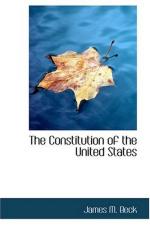The time was not ripe for any such union, and the reason was apparent. The colonies differed very much in the character of their populations, in the nature of their economic interests, and in their political antecedents. They were not wholly of the English race. Many nations in Europe had already contributed to the population. For example, New York was partly Dutch, and in Pennsylvania there was a considerable element of the Swedes, Germans, and Swiss. Moreover, the colonists were as widely separated from each other, measured by the facilities of locomotion, as are the most remote nations of the world to-day. Only a few men ever found occasion to leave their colony to journey to another, and most men never left, from birth to death, the community in which they lived. Outside of the few scattered communities in the different colonies there was an almost unbroken wilderness, with few wagon roads and in places only a bridle path. The only methods of communication were the letters and still fewer newspapers, which were carried by post riders often through an almost trackless wilderness.
Obviously, a working government could not easily be constituted between peoples of different religions, races, and economic interests, who, for the most part, never met each other face to face and with whom frequent communication was impossible.
The differences between the colonies and the mother-country with respect to internal taxation slowly developed into an issue of constitutionalism rather than of legislative policy. As in England, the immediate question affected the power of the Crown to give to the customs inspectors the power to make general searches and seizures, to enforce the navigation laws. In 1761 James Otis, of Massachusetts, made a fateful speech before the colonial legislature, in which, asserting the illegality of the search warrants on the ground that they violated the constitutional rights of Englishmen to protection in their own homes, he asserted that Acts of Parliament which violated the sanctity of the home were void and that, more specifically, they violated the charter granted to Massachusetts. Asserting the doctrine which at that time was the doctrine of the English common law, as stated by Coke and three other Chief Justices, he said:
“To say the parliament is absolute and arbitrary is a contradiction. The Parliament cannot make two and two five. Omnipotency cannot do it.... Parliaments are in all cases to declare what is for the good of the whole; but it is not the declaration of parliament that makes it so: there must be in every instance a higher authority, viz., GOD. Should an Act of Parliament be against any of His natural laws, which are immutably true, their declaration would be contrary to eternal truth, equity and justice, and consequently void; and so it would be adjudged by the Parliament itself, when convinced of their mistake.”
It is a curious fact that in the reaction from the




